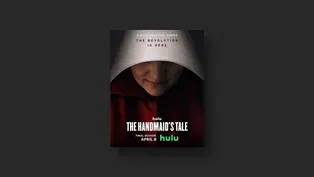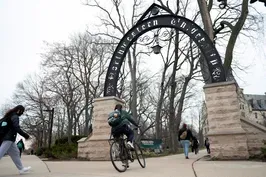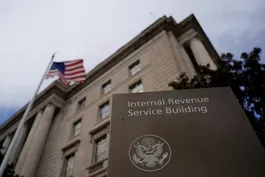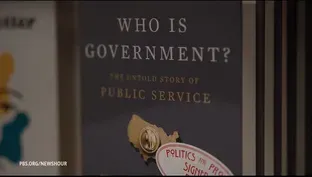
Trump pauses many of his tariffs but raises rate on China
Clip: 4/9/2025 | 13m 7sVideo has Closed Captions
Trump pauses many of his tariffs but raises rate on China
President Trump stunned many by pausing higher tariff rates on most other countries for 90 days. But the president raised tariffs on Chinese imports to 125 percent after Beijing retaliated overnight. This led to a historic day of rallies in the markets after multiple days of steep drops. Lisa Desjardins reports and Amna Nawaz discusses more with economists Simon Johnson and Douglas Irwin.
Problems with Closed Captions? Closed Captioning Feedback
Problems with Closed Captions? Closed Captioning Feedback
Major corporate funding for the PBS News Hour is provided by BDO, BNSF, Consumer Cellular, American Cruise Lines, and Raymond James. Funding for the PBS NewsHour Weekend is provided by...

Trump pauses many of his tariffs but raises rate on China
Clip: 4/9/2025 | 13m 7sVideo has Closed Captions
President Trump stunned many by pausing higher tariff rates on most other countries for 90 days. But the president raised tariffs on Chinese imports to 125 percent after Beijing retaliated overnight. This led to a historic day of rallies in the markets after multiple days of steep drops. Lisa Desjardins reports and Amna Nawaz discusses more with economists Simon Johnson and Douglas Irwin.
Problems with Closed Captions? Closed Captioning Feedback
How to Watch PBS News Hour
PBS News Hour is available to stream on pbs.org and the free PBS App, available on iPhone, Apple TV, Android TV, Android smartphones, Amazon Fire TV, Amazon Fire Tablet, Roku, Samsung Smart TV, and Vizio.
Providing Support for PBS.org
Learn Moreabout PBS online sponsorshipAMNA NAWAZ: Welcome to the "News Hour."
President Trump stunned many this afternoon by pausing higher tariff rates on most countries for 90 days just hours after they kicked in.
The president raised tariffs specifically on Chinese imports to 125 percent after Beijing retaliated overnight.
And a 10 percent across-the-board tariff that took effect last week remains in place.
All of this led to an historic day of market rallies after multiple days of steep drops.
The Dow closed almost 3,000 points higher, up nearly 8 percent.
The Nasdaq rocketed to its best day in nearly a quarter-century, up 12 percent, and the broadest measure, the S&P 500, had its biggest gain since 2008, up 9.5 percent.
Lisa Desjardins begins our coverage.
LISA DESJARDINS: An extraordinary change of course after a night of market turmoil and action by other global powers.
DONALD TRUMP, President of the United States: Well, I thought that people were jumping a little bit out of line.
They were getting yippy, you know?
They were getting a little bit yippy, a little bit afraid.
LISA DESJARDINS: Speaking at a NASCAR event at the White House, President Trump explained why he paused a wave of tariffs on much of the world hours after they took effect.
DONALD TRUMP: A deal is going to be made with every one of them, and they will be fair deals.
I just want fair.
They will be fair deals for everybody.
LISA DESJARDINS: Earlier, Treasury Secretary Scott Bessent insisted the pause has always been part of President Trump's strategy.
SCOTT BESSENT, U.S. Treasury Secretary: President Trump created maximum negotiating leverage for himself.
We are willing to cooperate with our allies and with our trading partners who did not retaliate.
It wasn't a hard message.
Don't retaliate, things will turn out well.
LISA DESJARDINS: But, before the announcement, Europe did retaliate with 25 percent tariffs, and China responded with 84 percent tariffs on U.S. goods, that in response to earlier tariff hikes from the Trump administration.
LIN JIAN, Chinese Foreign Ministry Spokesperson (through translator): The U.S. continues to impose excessive tariffs and exert extreme pressure on China.
China firmly opposes and will never accept such hegemonic and bullying behavior.
LISA DESJARDINS: President Trump's mercurial tariff policy has led Europeans to rethink their trade alliances.
Spanish President Pedro Sanchez met with leaders in Vietnam, which also faced steep tariffs now on hold.
He put it bluntly.
PEDRO SANCHEZ, Spanish President (through translator): No one wins with trade wars.
All countries lose.
LISA DESJARDINS: This a day after House Republican Whip Tom Emmer told "News Hour" that the Treasury secretary pledged in private yesterday that wide negotiations are starting now.
President Trump signaled as much at a Republican dinner last night.
DONALD TRUMP: These countries are calling us up, kissing my (EXPLETIVE DELETED).
DONALD TRUMP: They are.
They are dying to make a deal.
Please, please, sir, make a deal.
LISA DESJARDINS: In fact, just as U.S. markets were opening for the day, Trump gave investors a specific message, posting on TRUTH Social: "Be cool, and this is a great time to buy."
Before the White House reversed course, businesses spent the morning tentatively lowering their forecasts.
Delta Air Lines CEO told CNBC they no longer were expecting growth in 2025.
ED BASTIAN, CEO, Delta Air Lines: Everything has stalled.
And so there's been a freeze until we get better clarity.
And the hope is the administration moves quickly through the uncertainty.
I think our economy is going to continue to lose steam.
LISA DESJARDINS: Echoing that view at the time, J.P. Morgan Chase CEO Jamie Dimon on FOX Business.
MARIA BARTIROMO, FOX News Anchor: Do you personally expect a recession?
JAMIE DIMON, Chairman, J.P. Morgan Chase: I am going to defer to my economists to this point, but I think probably that's a likely outcome.
LISA DESJARDINS: On Wall Street, a sell-off of U.S. treasuries overnight roiled the bond market, as some investors fear the U.S. may no longer be a safe long-term bet.
Asked if that was a factor in freezing tariffs, Trump told reporters: DONALD TRUMP: The bond market is very tricky.
I was watching it.
But if you look at it now, it's beautiful.
The bond market right now, it's beautiful.
But, yes, I saw last night where people were getting a little queasy.
LISA DESJARDINS: On Capitol Hill today, Senate Democrats reacted sharply.
SEN. CHUCK SCHUMER (D-NY): Donald Trump is feeling the heat from Democrats and across America about how bad these tariffs are.
He is reeling, he is retreating, and that is a good thing.
LISA DESJARDINS: Speaking to Congress, U.S. Trade Representative Jamieson Greer was asked if this was all a ploy to help large investors buy low.
REP. STEVEN HORSFORD (D-NV): If it was a plan, if it was always a plan, how is this not market manipulation?
JAMIESON GREER, U.S. Trade Representative: It's not market manipulation, sir.
REP. STEVEN HORSFORD: Then what is it?
Because it sure is not a strategy.
JAMIESON GREER: We're trying to reset the global trade system.
REP. STEVEN HORSFORD: Who's benefiting?
What billionaire just got richer?
LISA DESJARDINS: Elsewhere in Washington, Michigan's Democratic Governor Gretchen Whitmer said she supported bringing back American manufacturing, but said the president's tariffs have been hard on her state, which President Trump won in 2024.
GOV.
GRETCHEN WHITMER (D-MI): I'm not going to sugarcoat it.
These last few days have been really tough for Michigan.
It really is a triple whammy, higher costs, fewer jobs, and more uncertainty.
LISA DESJARDINS: For how long?
That is also uncertain.
For the "PBS News Hour," I'm Lisa Desjardins.
AMNA NAWAZ: And joining us now to discuss all of this is Simon Johnson.
He's a professor at the MIT Sloan School of Management and the former chief economist at the International Monetary Fund.
Also with us is Douglas Irwin, an economist at Dartmouth College and the author of "Clashing over Commerce: A History of U.S. Trade Policy."
Gentlemen, welcome to you both.
And, Simon, I want to begin with you.
Just your reaction to the president's decision to pause most of those tariffs for 90 days.
What do you make of it and also why he did it?
SIMON JOHNSON, MIT Sloan School of Management: Well, it's a remarkable climb down, Amna, really.
I think the last week has been chaotic around the world, a lot of alarm, a lot of dismay across the American business sector.
It really felt like a strategy that had no point, no coherence.
It was very badly communicated.
So I think it's a big sense of relief for me personally and for pretty much everyone in the country and around the world that we have come to a slightly better, clearer place.
AMNA NAWAZ: When it comes to what may have gone behind this decision, as you saw in Lisa's report there was a sharp sell-off in U.S. government bond markets earlier today, and that followed Treasury yields, which typically investors would buy, rising the most that they have in decades.
Why is that sell-off significant and could that have impacted the president's decision?
SIMON JOHNSON: Well, a key piece of American strength is the idea that we're a safe haven for the world.
And a safe haven means, when something goes wrong, either out in the world or in the United States, people come into American government debt, into treasuries, which should mean that the interest rate will fall.
But, instead, the interest rate was rising.
So there was a pressure and at least a signal that we're not as safe as we thought we were, and perhaps there's a crisis of confidence in the United States.
All these thoughts were going around.
So I think the White House got the message that the bond market was signaling a lack of confidence in the strategy, and it was time to back off.
AMNA NAWAZ: So, Doug, some relief in some countries, many countries, who now get a 90-day pause to negotiate some of those terms, but, of course, the trade war with China has only ramped up.
When you look at these tariffs now between the U.S. and China, how do they compare with tariffs we have seen in the past?
DOUGLAS IRWIN, Dartmouth College: Well, this is really historically unprecedented, to have the two world's -- the world's two largest economies that had been highly integrated, relatively low tariffs on one another, raising tariffs to such an extent, I mean, over 100 percent in the U.S. case, up to about 84 percent in the case of China.
You can compare this to past tariff acts, such as the Smoot-Hawley Act of 1930.
That was more broad-based in terms of its impact.
But in terms of the total change in the tariff, doesn't even amount to this.
So this is really an amazing disintegration of trade between two large trading partners.
And, of course, we still have tariffs on other countries as well.
AMNA NAWAZ: And those other countries, of course, as you mentioned, still facing that 10 percent baseline tariff.
That's on top of, we should mention, to existing tariffs that went into place on Canada, Mexico on steel and aluminum.
What do we know, Doug, about the kind of impact that those existing tariffs will already have?
DOUGLAS IRWIN: Well, they will raise prices for consumers.
And a lot of consumers here are American businesses that depend on intermediate inputs and components to undertake production domestically.
So it's not just households.
It's businesses that have to adjust in terms of these higher costs, where you expect to see some retaliation as well.
The European Union has already indicated as much.
Obviously, a shrinkage of trade and uncertainty about whether these tariffs will remain in effect or whether they might be lifted at some point as well.
And one thing that's underestimated, or sometimes misinterpreted, is the poisoning of international relations.
So these are very disruptive.
They have been imposed, as President Trump has said, on our friends as well as our foes.
We have a lot of free trade agreements around the world.
Those are getting ripped up to some extent.
And so the disruption is worldwide in some sense.
AMNA NAWAZ: Simon, pick up on that idea.
It struck me earlier that the Treasury secretary said this 90-day pause will allow for negotiations for those countries to unfold on a country-by-country basis and that President Trump wants to be personally involved, he said, in each of those negotiations.
What do you make of that approach to do this country-by-country?
SIMON JOHNSON: I think there's going to be more than one 90-day extension, honestly.
It takes a long time.
A proper trade negotiation isn't 10 minutes in the Oval Office and 30 minutes down the hall to sign the papers.
You have got to spend days and sometimes weeks if you want to make real progress.
Now, if it's just for show, sure, that's relatively quick.
But 70 countries negotiating substantially with the United States and actually getting to a deal that we wouldn't otherwise have had, that takes a long time.
AMNA NAWAZ: Doug, what do you make of that, this country-by-country approach?
How do you see this playing out?
DOUGLAS IRWIN: Well, first of all, you have to sort of ask, what is the deal that we're looking for from other countries?
Other countries don't effect their trade deficit directly.
I think the extent of unfair trade practices has been exaggerated.
And we're hitting countries that we already have free trade agreements with, with these higher tariffs.
So we have actually a trade surplus with Australia.
We have a free trade agreement with them.
We have a trade surplus with Peru.
We have a free trade agreement with them.
And so it's quite indiscriminate who we're hitting with these.
And the question is, what sort of deal, what sort of the bilateral bargain is that we're asking for?
AMNA NAWAZ: Simon, holistically, when you look at this, the fact that these are now unilateral deals being negotiated, ramping up of a trade war between the two largest economies on the planet, does this suggest the end of the globalization era to you?
SIMON JOHNSON: It's not the end of anything.
It's the beginning of the -- of a phase, a new phase of stepping back from globalization, so de-globalization is what people are calling it.
But I think the key, Amna, is what happens with China.
So it's China's move next.
Where do they go with tariffs?
Where do they go with rare earths?
Where do they go with their holding of U.S. government debt, which was substantial?
China has a lot of cards to play.
We will see what happens, and we will see whether they want to de-escalate, and we will see whether Mr. Trump can find a way to de-escalate with respect to China.
AMNA NAWAZ: Do you see any potential off-ramps ahead?
So far, we have only seen the two countries going toe-to-toe in a matter of days.
Where does this go next between these two nations?
SIMON JOHNSON: Well, honestly, the most obvious off-ramp is for China to back down now.
But, politically, it's just very hard to imagine that they're going to want to do that.
And so, therefore, I think, as a practical matter, we're going to enter a new phase.
It's about the United States and China.
But that's a very important set of issues strategically and also in terms of trade.
These issues do need to be resolved, but are we going to do it in a peaceful, reasonable manner, or are we going to do it in some way that further destabilizes everyone's expectations and market prices?
AMNA NAWAZ: Doug, in terms of the way that markets globally and investors are looking at this, of course, we saw these rallies today, which the White House is pointing to as a sign of success in the strategy.
But that's, of course, in response to the tariffs being paused.
Does that say to you that if the tariffs go back up or if negotiations don't yield some kind of results, those markets will plunge once again?
DOUGLAS IRWIN: I don't know about plunge, but they will certainly go down.
Once again, if you look at the tariffs that the Trump administration had planned to impose, in fact, did impose at 9:00 -- 12:01 this morning, and then rescinded later in the day, they were very steep on other countries such as Vietnam, nearly 50 percent.
And so those are really draconian tariffs, once again, historically unprecedented.
This is only a pause.
The tariffs on Canada and Mexico had been paused previously.
But there's once again just creating a lot of uncertainty.
They could go into effect in the future.
The markets will respond to that negatively.
But the uncertainty is just unknowable at this point.
AMNA NAWAZ: Simon, it's a dangerous game to predict what happens next right now, but I will ask you the same question in the last minute we have.
What do you see happening now?
SIMON JOHNSON: More uncertainty, I think, Amna.
That's going to be the word for the quarter, maybe for the year.
And it's very hard for businesses in particular to make any kind of sensible decisions when everything is so uncertain.
Should we invest in this or in that in the United States or elsewhere?
Now, consumers obviously have to struggle with some of the same decisions.
For them, the uncertainty may mean they might want to make some purchases now before tariffs go into effect.
But on the other hand, they might lose their job, so perhaps they shouldn't make any purchases at all.
So uncertainty is generally going to have a slowing effect.
AMNA NAWAZ: Simon Johnson, Douglas Irwin, great to speak with you both.
Thank you so much for your insights.
Appreciate it.
'Handmaid's Tale' stars on the evolution of their characters
Video has Closed Captions
Clip: 4/9/2025 | 6m 54s | 'The Handmaid's Tale' stars on the evolution of their characters as series reaches its end (6m 54s)
How the global trade wars could affect personal finances
Video has Closed Captions
Clip: 4/9/2025 | 4m 45s | How the global trade wars could affect personal finances of Americans (4m 45s)
News Wrap: White House freezes Cornell, Northwestern funds
Video has Closed Captions
Clip: 4/9/2025 | 4m 58s | News Wrap: White House freezes funds meant for Cornell and Northwestern (4m 58s)
Top IRS official quits over plans to share personal data
Video has Closed Captions
Clip: 4/9/2025 | 7m 11s | Top IRS official quits over plans to share personal data with immigration authorities (7m 11s)
What tariffs mean for the U.S. footwear industry
Video has Closed Captions
Clip: 4/9/2025 | 4m 2s | What tariffs and trade war threats mean for the U.S. footwear industry (4m 2s)
Work of public servants highlighted in 'Who is Government?'
Video has Closed Captions
Clip: 4/9/2025 | 10m 16s | Michael Lewis highlights crucial work of public servants in 'Who is Government?' (10m 16s)
Providing Support for PBS.org
Learn Moreabout PBS online sponsorshipSupport for PBS provided by:
Major corporate funding for the PBS News Hour is provided by BDO, BNSF, Consumer Cellular, American Cruise Lines, and Raymond James. Funding for the PBS NewsHour Weekend is provided by...
















